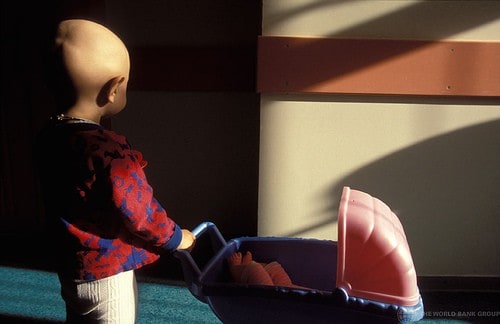The development of simple tests to predict a leukemic relapse in young patients is a step closer thanks to researchers from the Sainte-Justine University Hospital Research Center and the University of Montreal. Approximately 20 percent of young leukemia patients who are treated with stem cells derived from umbilical cord blood will experience leukemic relapse. The researchers’ findings, published recently in Blood,demonstrate that the blame falls partially on a subset of white blood cells called “T cells.” Until now, this process had been poorly understood. “We have shown that a particular marker on the T-cells, PD-1, was found significantly more frequently in those young patients in whom relapses were about to occur,” says lead author, Dr. Hugo Soudeyns, an investigator at the Sainte-Justine University Hospital Research Center, affiliated with Université de Montreal. “PD-1 is also an indicator of ‘T cell exhaustion’, a process whereby T cells lose their capacity to multiply and are less effective at fighting viruses and cancer cells.”
Window of vulnerability
Dr. Soudeyns and his colleagues analyzed blood samples from young children who received an umbilical cord blood transplant for the treatment of blood disorders, including leukemia. They were particularly interested in studying the three to six month time period post-transplantation, when the children were most susceptible to both relapse and infection. During this time, expression of the PD-1 marker peaked, suggesting that many of these T cells were at the end of their life cycle and thus less effective.
“Our findings suggest that measurement of exhaustion markers such as PD-1 could serve as an early predictor of leukemic relapse – a very serious complication,” says Dr. Soudeyns. “Our next step is to repeat these experiments in larger groups of patients.”
The input of the ELISpot reader
Thanks to the financial support of the Fondation Centre de cancérologie Charles-Bruneau, Dr Soudeyns’ team was able to count on a new ELISpot reader, which analyzes the reaction of cells to stimulus. This reader played an important part in the study of blood samples selected for this test. The Fondation is proud of its positive contribution to this research and congratulates Dr Soudeyns for this remarquable scientific breakthrough.
Leukemia and stem cell transplants
Leukemia is a type of blood cancer. Children with leukemia are frequently treated with chemotherapy and radiation to eradicate the cancer cells, but this treatment also leads to the destruction of both their red and white blood cells. To replenish these cells, leukemic children often undergo a bone marrow transplant. Another similar procedure involves transplantation of umbilical cord blood instead of bone marrow.
Study Details
The study, led by Dr. Hugo Soudeyns, an investigator in the Viral and Immune Disorders and Cancers research axis at the Sainte-Justine University Hospital Research Center and the Departments of Microbiology & Immunology and Pediatrics at Université de Montréal, was published online on August 2, 2011 in the scientific journal Blood. Dr. Natacha Merindol is first author, followed by Dr. Martin A. Champagne and Dr. Michel Duval. The study was published in the October 26, 2011 issue of Blood and was highlighted in an editorial that underscored the originality of the work.
The study was funded by le Fonds de recherche en santé du Québec (FRSQ), Héma-Québec, la Fondation Centre de cancérologie Charles-Bruneau, the Cole Foundation, and la Fondation de l’Hôpital Sainte-Justine.
Links:
· Dr. Hugo Soudeyns profile at Sainte-Justine University Hospital Research Center
About the CHU Sainte-Justine Research Center
The CHU Sainte-Justine Research Center is a leading mother-child research institution affiliated with Université de Montréal. It brings together more than 1200 people, including over 200 researchers and clinician-researchers and 450 graduate and post-graduate students who carry out fundamental, clinical, and evaluative research on maternal and child health. Research work falls under six research axes, namely Health Outcomes; Brain Diseases; Musculoskeletal Diseases and Movement Sciences; Viral and Immune Disorders and Cancers; Fetomaternal and Neonatal Pathologies; and Metabolic Health. It is focused on finding innovative prevention means, faster and less invasive treatments, as well as personalized approaches to medicine. The Center is part of the Sainte-Justine University Hospital Centre, which is the largest mother-child centre in Canada and one of the four most important pediatric centres in North America. For more information, please visit www.chu-sainte-justine.org/research/
About the Fondation Centre de cancérologie Charles-Bruneau
Since 1990, the Fondation Centre de cancérologie Charles-Bruneau gives children with cancer the best chances of recovery by financing research and supporting the development of projects in the area of pediatric oncology. Since then, nearly $42 million dollars have been invested, notably in the creation and the development of the Centre de cancérologie Charles-Bruneau of CHU Sainte-Justine. www.charlesbruneau.qc.ca
Media relations
William Raillant-Clark
International Press Attaché
University of Montreal (officially Université de Montréal)
514-343-7593
[email protected]
@uMontreal_News
Mélanie Dallaire
Communications and public affairs CHU Sainte-Justine
Phone (514) 345-7707
Pager (514) 415-5727
[email protected]
Source and information:
Marise Daigle
Communication Consultant
Sainte-Justine University Hospital Research Center
514-345-4931, extension 3256
[email protected]
David Letky
Communication Officer
Fondation Centre de cancérologie Charles-Bruneau
514-256-0404, extension 230
[email protected]

